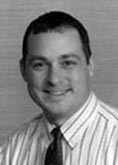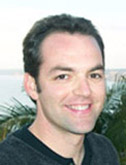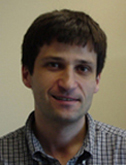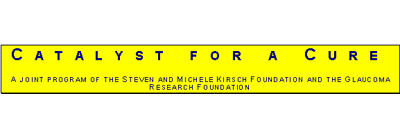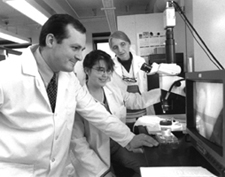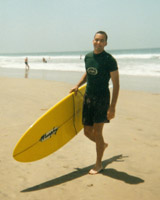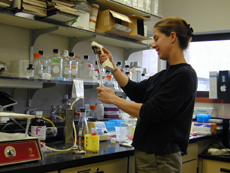 |
|
 |
|
|
Dr. Calkins's primary interests are split between the molecular architecture of the primate retina and the neurochemistry of retinal disease. During his post-doctoral research Dr. Calkins discovered that the primate retina contains multiple lines of neurons specialized for different aspects of visual function. He demonstrated that these neurons have distinct projection sites in the brain and unique circuitry that renders them highly efficient for vision. As a laboratory director, Dr. Calkins expanded his interests to diseases that kill neuronal cells within the retina and optic nerve fibers. For this work, he developed a technique to monitor the expression of genes in dying neurons for the purposes of identifying potential therapeutic targets. He is currently investigating how chemical receptors and signaling molecules contribute to normal retinal circuits and how their function is altered in retinal diseases like glaucoma and macular degeneration. Dr. Calkins received a BS in mathematics from the University of Michigan 1989 and his Ph.D. in Neuroscience from The University of Pennsylvania in 1994. He received post-doctoral training in the distinguished laboratory of Dr. Heinz Wässle at the Max Plank Institute for Brain Research and at the Krieger Mind-Brain Institute of Johns Hopkins University. In 1998, Dr. Calkins joined the faculty of the University of Rochester Medical Center, where he held the title of Director of The DeStephano Laboratory of Retinal Genomics. In 2004, Dr. Calkins moved to Vanderbilt University. He is the author of many articles and book chapters on retinal organization and vision and has received honors for his work from the National Eye Institute, Research to Prevent Blindness, and the Sloan Foundation. What made you want to join the CFC/glaucoma collaborative? "The collaborative allows me to learn new approaches and disciplines beyond my field of expertise." How did you end up where you are today? "I've always been interested in biological mechanisms and motivated by a keen desire to understand what makes them work. I ended up in academic research because I felt that I would enjoy the greatest degree of freedom in my pursuits." How do you think the world will be different in 100 years? "Medicine will be less invasive, less expensive and more available. I think by then we will have learned to understand and better control how we affect the environment and climate. I think we will enjoy a global economy with an open coalition of democratic governments." What are some of your favorite movies and books? "Arrowsmith (Sinclair Lewis), A Portrait of the Artist as a Young Man (James Joyce), Steppenwolf (Herman Hesse). Movies: Blue Velvet, Apocalypse Now, Millers Crossing, Forest Gump." If you could meet any person from any era, who would it be and why? "Theodore Roosevelt because he was more than any other president instrumental in moving the world into the modern era of international trade, politics and ethics. TR was utterly convinced of his own sense of moral righteousness, acted accordingly, and learned from his mistakes without regretting the decisions that led to them."
Dr. Horner's primary interests are in the biology of stem cells and neural regeneration. During his post-doctoral research he discovered that the adult spinal cord contains cells that remain multipotent and capable of producing nerve cells throughout life. These cells are called progenitor cells and express a proteoglycan called NG2. Dr. Horner has shown that spinal progenitor cells can be stimulated to divide in the presence of Epidermal Growth Factor. He is currently investigating the role of progenitor cells in the intact and injured CNS with the goal of determining what factors may be used to facilitate the replacement of damaged cells. Dr. Horner received an MS and Ph.D. in Physiology from Ohio State University in 1995. He did his post-doctoral research in the distinguished laboratory of Dr. Fred Gage at the Salk Institute. In 2001, Dr. Horner joined the faculty of the Department of Neurological Surgery at the University of Washington. He is the author of many articles and book chapters on spine trauma, regeneration and stem cell biology and is co-founder of Route28 Summits in Neurobiology. Dr. Horner has received honors for his work from the National Neurotrauma Society, the Asilomar Neural Regeneration Conference, Christopher Reeve Paralysis Foundation Consortium on Spinal Cord Injury and the National Institute of Neurological Disorders and Stroke. What made you want to join the CFC/glaucoma collaborative? "As a post-doctoral fellow I was honored to participate in the Christopher Reeve Paralysis Foundation Consortium on Spinal Cord Injury. The experience created and solidified a unique perspective on the power of collaborative research. When I became an Assistant Professor I wanted to carry that same process through to new challenges. My interests have always been on brain repair and my laboratory focuses on regeneration biology. Because of this, I viewed the CFC Glaucoma Consortium as a new opportunity to apply a collaborative approach to an interesting and challenging new field." What traits/characteristics do you feel are important today to succeed in research? "One of the key traits is having a tough skin and being able to take criticism. Scientists are often reviewed by their peers and it is thus an established aspect of research for colleagues to criticize and find fault in each others work. From my experience, successful researchers are able to take criticisms and advice and strengthen their work to overcome perceived shortcomings. Tenacity pays off. I still have a copy of the reviews of my first manuscript: very humbling! Other than tenacity and a durable affinity for biology, I believe good training is imperative. I attribute much of my success to excellent training. Becoming a researcher involves a long series of apprenticeships. I count myself very lucky to have trained with the scientists that have shaped my career and steered me down a successful path." Describe a typical day for you. "A typical day is a mix of reading articles, reviewing data and making suggestions or helping to problem-solve a student's project, writing a grant or paper, and attending meetings or performing administrative tasks. It often involves bounding from one activity to another. The best days are spent looking through the microscope and discussing new and wild ideas with colleagues." How do you think the world will be different in 100 years? "Getting from here to there will be much easier. Your hovercraft will take you automatically to your destination while you relax in the back sipping espresso and catching up on the latest news from Mars via your implanted computer chip mated to your visual cortex. Yes, there will still be espresso and I will be alive utilizing regenerated body parts." How do you spend your free time outside the lab? "I like outdoor activity when I have free time. I enjoy surfing, kayaking, trail running and hiking with my wife and Australian Shepard."
Dr. Nicholas Marsh-Armstrong is a research scientist at the Kennedy Krieger Institute and an Assistant Professor in the Department of Neuroscience at the Johns Hopkins University School of Medicine. Dr. Marsh-Armstrong's research focuses on trying to understand how a symphony of gene expression sets up the structure and function of the nervous system. He focuses on the use of transgenic technologies to shed light on the rules that govern developmental gene regulation in the nervous system. His ultimate goal is to understand how aberrant gene regulation leads to developmental disorders. Dr. Marsh-Armstrong received his BA magna cum laude in Chemistry and Philosophy at Haverford College. He went on to pursue graduate work in Neuroscience and Cellular and Developmental Biology at Harvard, receiving his PhD in 1994. He then served as a post-doctoral fellow at the Carnegie Institution of Washington, Department of Embryology. Since 2001, he has been an assistant professor at the Johns Hopkins University School of Medicine and the Kennedy Krieger Institute. Dr. Marsh-Armstrong was the recipient of the Certificate of Distinction in Teaching at Harvard, and was a recipient of a Howard Hughes Medical Institute pre-doctoral fellowship and a Jane Coffin Childs Memorial Fund for Medical Research post-doctoral fellowship. What made you want to join the CFC/glaucoma collaborative? "The idea of joining forces with other young laboratories in order to help understand and hopefully cure a disease as prevalent and important as glaucoma, was an opportunity I could not pass up." What traits/characteristics do you feel are important today to succeed in research? "The most important trait to be a good (and hopefully successful) scientist is reasoned skepticism. We need skepticism to question our understanding at every level and reason to know when that skepticism can be put to good use. I am in science because I believe I have those attributes." Describe a typical day for you. "Every day is different. The only common element is the pace - it is relentless. Mornings and evenings are filled with the joy and craziness of a parent with three young children. The days are split between the laboratory, the office, seminars and other meetings. Most days are fun." How do you think the world will be different in 100 years? "I think the world is in too much turmoil to guess the future. I would like to believe that the world will be filled with less disease, less poverty, more equity and more justice." How do you spend your free time outside the lab? "I have three young children: I have no free time! Most of my activities revolve around my kids; for example, coaching my son's soccer team. Though, most weeks I still fit in time to play soccer myself - that is my therapy."
Dr. Vetter's research is directed towards understanding the mechanisms that regulate the development of different classes of neurons within the vertebrate retina. One aspect of the research focuses on the development of retinal ganglion cells, which are the cells that connect the retina to the brain. Her lab has identified a transcription factor (ath5) that is important for the normal development of this class of neurons. Her group is now investigating the mechanisms regulating the activity and expression of this and related factors during retinal development. Dr. Vetter obtained her Ph.D. in 1994 from the University of California, San Francisco. She also did her post-doctoral training at UCSF before joining the faculty at the University of Utah in 1996. Dr. Vetter was named a Pew Scholar in the Biomedical Sciences in 1998. Her work is also supported by several grants from the National Institutes of Health and the National Science Foundation. What made you want to join the CFC/glaucoma collaborative? "I realized that it was important for me to start thinking more about the clinical relevance of my work. The CFC/glaucoma collaborative provided an opportunity to focus on glaucoma, which is a serious disease that affects many people. Since my lab is interested in retinal ganglion cell genesis it made sense to think about retinal ganglion cell loss due to disease. It also seemed like a great opportunity to interact with other basic scientists and work as a team." What are your points of view on collaborations? "I have always enjoyed collaboration and find that it has really helped me do things that I could not do alone. I have learned many things from my colleagues and feel that collaboration builds community and makes science more fun and interesting." How do you think the world will be different in 100 years? "I think that it will be more different than we can possibly imagine. I think that people will live on places other than earth. I think that people will live 50% longer than they do now, and I think that many aspects of the earth's environment, even places that we consider wild, will be monitored and actively managed. I also think that there will be many fewer countries than there are now due to consolidations like the European Union." What are some of your favorite movies and books? "Favorite movies: O Brother Where Art Thou; Bagdad Cafe Favorite books: Shipping News; Guns, Germs and Steel" If you could meet any person from any era, who would it be and why? "Although I am not at all religious, I would like to meet Jesus since his life continues to impact our political and social world every day. It would be fascinating to see who he really was." |
